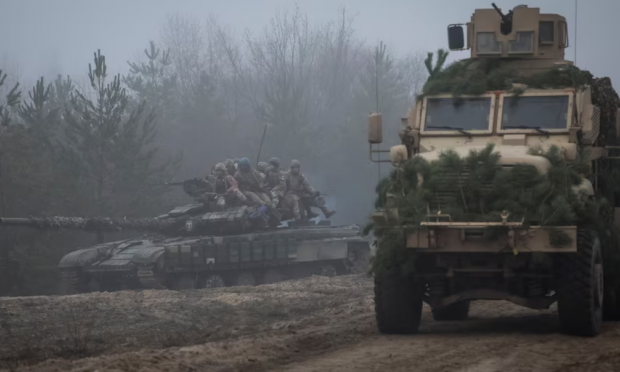Russia may be carrying out "distraction attacks" on the Ukrainian front to divert attention from its real targets in Lugansk, while its operation in the city of Bakhmut appears to be peaking, according to the Institute for the Study of War.
ISW, a Washington-based think tank, wrote in its latest overview of the conflict that these "limited attrition attacks" were being carried out across most of the front line in Ukraine to "disperse and distract" Ukrainian forces and to "set conditions for the launch of a decisive offensive operation" in the eastern Lugansk region.
In recent days, small Russian strike groups of 10 to 15 soldiers have been launching these "limited ground attacks" in two key front-line sectors, in the central Zaporizhia region along the Kamianske-Mali Shcherbaki-Mala Tokmachka line and in Ugledar of the west Donetsk region.
The Russian army entered Ugledar and entrenched on the outskirts of the city, according to information transmitted by the Russian news agency RIA Novosti. Russian troops were able to break through Ukrainian defenses and enter its suburbs in three days, according to Russian sources.
At the moment, fierce fighting is taking place on the territory of the city, while, according to sources, Russian troops have successfully established their presence on the outskirts of the city, occupying the shelters that exist there. At this time it is known that the Russian army has already occupied the southern part of the city and is trying to move north. At the same time, efforts are being made to encircle Ugledar in order to prevent the transfer of additional forces of the Ukrainian army and to block the retreat of Ukrainian troops.
However, ISW noted that Ukrainian officials have said that these attacks are aimed at breaking up their defense lines. "The size and nature of these attacks suggest that they are more likely to distract and pin Ukrainian forces in discrete areas of the front than a concerted effort to resume offensive operations to gain ground in central Zaporizhia and western Donetsk," according to the think tank's analysts.
The ISW said it is notable that these attrition attacks are taking place as the pace of Russian operations around Bakhmut, led by the Wagner Group paramilitary unit, appears to be "declining".
The Wagner Group, led by Russian businessman Yevgeny Prigozhin, said last week that Russia had seized the salt mining town of Soledar, a small town nine miles north of Bakhmut. Since then, Prigozhin's fighters and the Russian army have been advancing on the industrial city of Bakhmut, which has been one of the hot spots of the war.
"Following the Russian capture of Soledar in mid-January, attacks on Bakhmut and surrounding settlements apparently dropped, suggesting that the Russian offensive to capture Bakhmut may be peaking," ISW said.
Analysts said the Wagner Group had failed to deliver on its promise to secure Bakhmut and was unable to move beyond small regular gains in Soledar and other small settlements around it.
"The Russian military leadership may therefore have decided to de-prioritize operations around Bakhmut after recognizing the low probability that Wagner will actually be able to undertake the arrangement," said the ISW, which also said on Tuesday that the Russian forces had not made "operationally significant gains" around Bakhmut.



